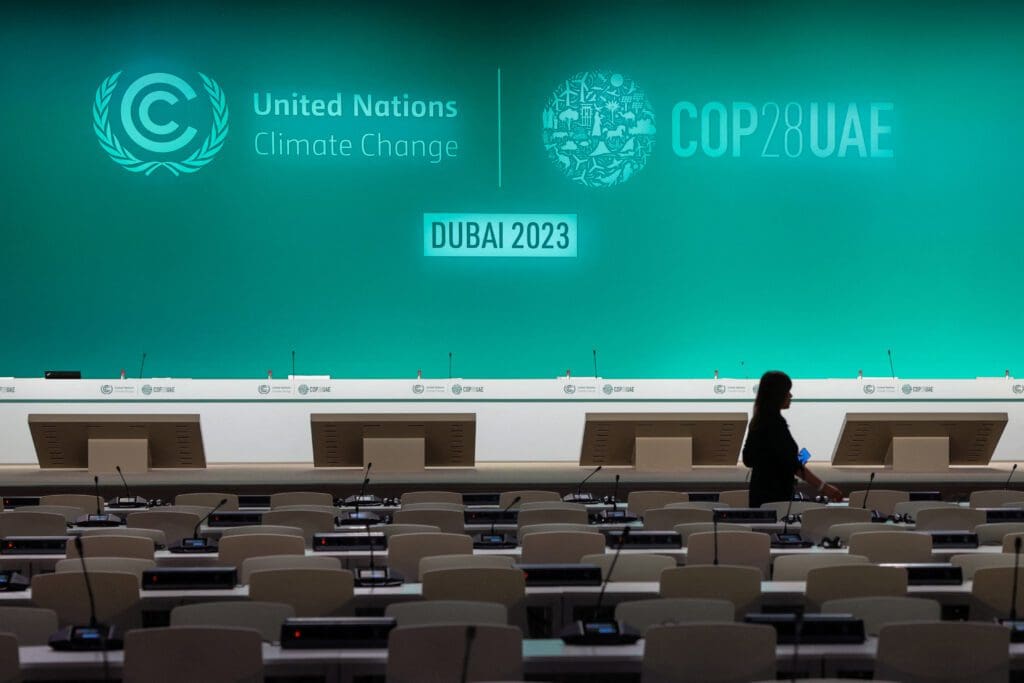The states of the Gulf Cooperation Council (GCC) have been pivotal to the global economy for decades, accounting for around 30 percent of confirmed petroleum reserves worldwide and 20 percent of total natural gas reserves. Yet as the effects of climate change intensify and global climate policies impact the bottom line for hydrocarbon exporters, those states have increasingly engaged in climate diplomacy and become players in the green movement at home and abroad.
Questions persist, however, over the depth of the Gulf states’ commitment to a greener future. Critics view GCC climate diplomacy as mere “greenwashing” rather than a sincere effort to reduce emissions and address their role in mitigating climate change. Yet such charges ignore the complexity of the issue for the Gulf states, which are on the frontline of both the environmental effects of climate and the economic consequences of the green transition.
This dilemma will be on display at the 2023 United Nations Climate Change Conference known as COP28, which will be held in Dubai. With significant international attention focused on regional climate policies and decarbonization initiatives, is COP28 likely to accelerate meaningful climate action from within the region?
Weathering Unique Climate Challenges
The Gulf region faces a unique set of environmental challenges. In arid climates, such as those of Bahrain, Kuwait, Oman, Qatar, Saudi Arabia, and the United Arab Emirates, summer temperatures soar well above 40 degrees Celsius and humidity often exceeds 80 percent, creating harsh conditions for the region’s inhabitants. While the widespread use of air conditioning offers respite for some, it also increases energy consumption and carbon emissions—a vicious cycle that ultimately drives temperatures even higher.
Beyond the sweltering heat, GCC countries have also long grappled with limited freshwater resources. This situation is exacerbated by the region’s geographical features, such as vast desert expanses and declining groundwater. As such, these states rank among the world’s 17 most water-stressed nations. Meanwhile, the region’s agricultural sector faces increasing difficulties as water-intensive crops struggle to survive. This raises concerns about food security, given the region’s import dependency, with some nations importing up to 90 percent of their food. The region remains vulnerable to climate-induced disruptions to global agriculture and supply chains, as experienced during the pandemic.
Moreover, Gulf coastlines are projected to confront rising sea levels as a direct consequence of global warming. Nearly 90 percent of the region’s population dwells in urban, largely coastal areas. Many Gulf states have already experienced the impacts of extreme weather events, exemplified by deadly flash floods in the UAE’s Fujairah emirate, Qatar, Saudi Arabia, and Oman, a country that has also experienced a spate of deadly cyclones in recent years.
Yet, Gulf nations are confronting a climate conundrum. Measures implemented elsewhere to reduce greenhouse gas emissions, especially those aimed at reducing fossil fuel consumption, could potentially reduce oil demand and prices, cutting oil revenues and limiting the resources for the Gulf nations to cope with the adverse impacts of climate change.
Acting on climate despite the paradoxes
The GCC’s climate challenges underscore the urgency and complexity of addressing climate change in a region where the stakes are undeniably high. Gulf countries, despite a long history of skepticism around the issue, are now promoting themselves as leaders in energy transition. The UAE is the second Gulf nation after Qatar, and third in the Middle East and North Africa (MENA) region following Egypt last year, to host a COP. Riyadh also hosted the United Nations Climate MENA Week this year.
Moreover, Gulf nations are signatories of the Global Methane Pledge, members of the Net Zero Producers Forum, and part of the European Union’s Clean Energy Ministerial (CEM) and Mission Innovation (MI) forum. These commitments demonstrate Gulf nations’ determination that phasing out greenhouse gas emissions will not necessarily come at the expense of hydrocarbon revenues, as these can finance energy transition projects aimed at coping with the impacts of climate change. Speaking on behalf of the Arab Group, Saudi Arabia’s lead negotiator Albara Tawfiq told the COP27 plenary that the UN “needs to address emissions and not the origins of the emissions.” This position was reiterated by the UAE’s COP28 president: “Our aim should be focused on phasing out fossil fuel emissions.” An emphasis on eliminating emissions rather than fossil fuel production is a common position among Gulf oil producers, placing the responsibility for reducing greenhouse gases on consumers.
Domestically, the six nations of the GCC are accelerating the diversification of their energy sources and reducing the conventional energy sector’s carbon footprint. All regional countries are rolling out national institutions, policies, and regulatory frameworks to achieve such goals. Five GCC members aspire to reach net-zero emissions by, or around, 2050. Investments in low-carbon energy technologies, such as Carbon Capture, Utilization, and Storage (CCUS), solar, and wind power, are rising, demonstrating commitment to sustainability, and reducing the dominance of hydrocarbons in local energy production.
For instance, three large CCS facilities in Qatar, the UAE, and Saudi Arabia together account for almost 10 percent of worldwide CO2 absorbed yearly. The UAE has invested heavily in nuclear power, green hydrogen, and solar power, constructing the world’s largest solar plant (5GW by 2030). ADNOC, a UAE state-owned enterprise, has moved up its net-zero target, aiming for 2045, and is actively expanding carbon capture technology. Saudi Arabia is pushing for sustainable electricity production (11.8GW by 2025) and is willing to build the world’s largest green ammonia production plant. QatarEnergy is constructing a $1 billion blue ammonia plant with CCUS technologies. Hydrom, an Omani company, has awarded contracts worth $10 billion to develop a green ammonia production plant, with construction scheduled to commence in 2027. The total installed renewable energy capacity in the GCC has increased from 67 megawatts in 2012 to 5672 megawatts in 2022, an 85-fold increase in just a decade.
While fossil fuel production is a significant driver of emissions and climate change, oil revenues remain essential to mitigate climate impacts. Reinvesting these revenues in cleaner sectors, including vertical farming, aquaculture, and desalination projects can help address regional food and water insecurity. GCC nations account for over 60 percent of worldwide water desalination capacity, generating roughly 40 percent of total desalinated water globally via over 400 desalination facilities, and GCC governments have set aside $100 billion to increase this capacity by another 37 percent.
Does Hosting COP28 Matter for Regional Climate Action?
GCC countries have become increasingly involved in international climate negotiations, engaging in emissions reduction, climate finance, and navigating collaborative avenues in climate adaptation. Many observers scrutinize these diplomatic engagements because they seemingly clash with their continued oil and gas production. Yet, the evolutions of climate mitigation and adaptation ambitions and commitments along with playing host to major events in this space signal a new direction from regional leaders on climate action. In judging the sincerity of these initiatives, it is crucial to be aware of the difficulty these countries face in making an abrupt and immediate switch. Whereas all nations face the economic difficulties of energy transition, those difficulties are particularly acute for economies reliant on energy production and export.
Hosting COP28 provides an opportunity to drive further regional and international change in the fight against climate change. The COP28 debates will focus on the completion of the first-ever Global Stocktake in the history of climate negotiations. Global Stocktake is a crucial mechanism to measure the collective progress towards meeting the goals of the Paris Climate Agreement—where countries and other stakeholders stand today and how they can come up with ambitious climate commitments by 2025. Already the first UNFCCC Synthesis Report of the Technical Dialogue of the First Global Stocktake highlighted that we will exceed 1.5 degrees of warming, estimating that global temperatures will rise by 2.4-2.6 degrees Celsius by the end of the century based on today’s climate pledges. It is anticipated that the outcomes of the Global Stocktake will push for accelerated climate action globally and in the Gulf.
Building on the momentum of Egypt’s COP27, the UAE can sustain regional momentum to tackle climate change. Furthermore, the UAE’s strategic investments in renewable energy, green hydrogen, solar power, and carbon capture technologies demonstrate a regional template for transitioning away from hydrocarbon reliance. Productive competition and cooperation among Gulf nations to accelerate climate action is already gaining momentum. Around COP27, Oman announced a national net-zero strategy, and Kuwait committed to reaching carbon neutrality by 2050. In late 2022, the Arab Coordination Group pledged $24 billion in climate action financing by 2030, and the Gulf Exchanges announced unified ESG metrics for GCC companies. COP28 will also provide a platform for regional climate cooperation, particularly through the continuation of the Middle East Green Initiative to plant 50 billion trees across the Middle East.
As host of COP28, the UAE aims to include a wide range of stakeholders, including the youth, civil society, NGOs, the private sector, and indigenous people to promote dialogue and awareness about climate action among different segments of society. This includes a platform for anyone not accredited to attend the actual COP forum. Through this year’s COP, the UAE aims to unify global efforts, promote international collaboration, and accelerate climate action in the Gulf and beyond. While skepticism persists, there is good reason to believe that the commitment of GCC states to reduce their carbon emissions and diversify their economies has shifted from mere diplomacy to sustained climate action.



